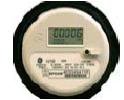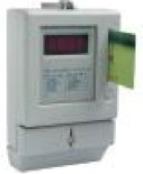Difference between revisions of "Metering and Billing Systems"
From energypedia
***** (***** | *****) |
***** (***** | *****) |
||
| Line 51: | Line 51: | ||
*less forgery proof | *less forgery proof | ||
*costs for re-collection of coins and selling system for coins/cards | *costs for re-collection of coins and selling system for coins/cards | ||
| + | |||
| + | <br> | ||
| + | |||
| + | = Current limiter = | ||
| + | |||
| + | <u>Advantages</u> | ||
| + | |||
| + | *simultaneously protecting against overcurrent (actual purpose) | ||
| + | *delimiting peak demand | ||
| + | *no meter reading required; flat rates according to max. amperage | ||
| + | |||
| + | <u>Disadvantages</u> | ||
| + | |||
| + | *danger of fraud and theft of switch fuses | ||
| + | *additional costs for replacement of cut out fuses | ||
| + | *time of usage not considered; less fair | ||
Revision as of 14:55, 6 June 2009
Standard kWh meter
Advantages
- fair and transparent
- reading less frequent than collection; if customers go to office, there is cost reduction
- amount and time related tariffs possible (demand steering)
Disadvantages
- high costs (metering device & reading)
- dis- and re-connection in case of late payment
- complicated reading and billing
Pre-paid system with coins or cards
Advantages
- fair and transparent
- no meter reading
- no overdue costs
- no costs for dis- and re-connection
- close to “ability to pay”-variations
- coins less expensive than cards
Disadvantages
- relatively high cost for metering device
- less forgery proof
- costs for re-collection of coins and selling system for coins/cards
Current limiter
Advantages
- simultaneously protecting against overcurrent (actual purpose)
- delimiting peak demand
- no meter reading required; flat rates according to max. amperage
Disadvantages
- danger of fraud and theft of switch fuses
- additional costs for replacement of cut out fuses
- time of usage not considered; less fair






















